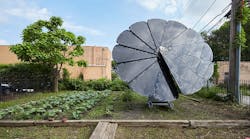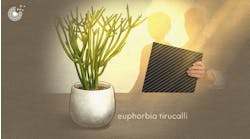Mohawk Group and nonprofit Groundswell have teamed up to install a new smartflower solar energy unit near three Rockingham County Schools in North Carolina — a project that will bring the benefits of clean solar power to the area, create educational opportunities for students and contribute to Mohawk’s sustainability efforts.
The smartflower technology was unveiled during a special event in Eden, NC, which is also the home of Mohawk’s historic Karastan woven carpet plant. Planted on the campus of Eden’s Central Elementary School, the smartflower is located adjacent to Holmes Middle and Morehead High schools.
Smartflower Aesthetics
The smartflower looks and moves like an actual flower, with petals that open and follow the sun during daylight hours. The petals close at night and during inclement weather. This allows it to maximize and retain the solar energy, while still protecting it from damage and residue buildup.
“Sometimes when you leave solar out, the residue minimizes its effectiveness. So it closes down at night and then opens back up in the morning and it tracks the sun as the sun moves throughout the day in order to maximize its effectiveness,” explains George Bandy Jr., vice president of sustainability and marketing for Mohawk Group.
In addition to providing sustainable energy, the smartflower provides educational opportunities for the students, including operating the device, learning how it works and is installed, and informing them about the careers available within the sustainable energy field.
“For students, when you talk about climate change and greenhouse gas emissions, about the oceans rising, sometimes that’s a little hard for them to recognize because they’re not directly connected to that,” Bandy says. “But if they could see a solar flower in their school and learn from it and think about the advantage of technology and how it saves energy, then that gives them a real-time resource.”
Smartflower Compliments Mohawk Products
The smartflower project is part of Mohawk’s larger “handprinting strategy” and complements two of its latest Living Product Challenge Petal Certified flooring products: Pivot Point enhanced resilient tile and Sunweave woven broadloom/area rug.
“Most of the time when you talk about sustainability, you talk about leaving footprints, and a footprint is actually of the mindset that you’ve used energy, water, carbon, natural resources or social community impacts,” Bandy says. “We’re doing a handprint, which means that we’re already looking for ways to offset all the greenhouse gas emissions, all the water, the energy; and connect with communities where we work, play and live, so there’s a tangible resource for social sustainability.”
The Living Product Challenge provides a framework for manufacturers to reimagine design and construction of products to function as elegantly and efficiently as anything found in the natural world. All Living Products are created to be net positive and benefit people and the environment. Additionally, Petal Certification dictates that products be free of toxins, informed by biomimicry and biophilia, and socially responsible and respectful of the rights of workers.
Both Pivot Point and Red List-free Sunweave (which is manufactured in Eden) are designed to give more back to the environment than they take during their entire life cycle—the heart of the handprinting concept.
Mohawk Group has engaged in this partnership with Groundswell to offset the energy and resources used during some of its manufacturing processes. Groundswell is a nonprofit that develops community solar projects and subscriber management programs that connect solar power with economic empowerment for marginalized communities.
Listen: The Value of Smartflower
Your browser does not support the audio element.More Smartflowers in the Future
The solar energy project in North Carolina is the second of 10 smartflowers to be planted across the U.S. over the next three years. The first was installed during Neocon in Chicago’s Bronzeville neighborhood. Looking ahead, Bandy says there are several locations and alternative locations, including places like Dallas; Austin, TX; Atlanta; and Oakland, CA. When choosing a place, they consider:
- Both rural and urban areas
- Whether the school districts have STEM programs
- What kind of social and community impact return on investment the project will have
“When we talk about return on investment with this, it’s really not a financial return on investment — it’s more of a social return on investment. How many people can we touch, how many people can we impact, how many people can we help to understand that solar’s not as difficult or complex as people might think that it is?” Bandy explains. “Those are the types of returns on investment that we’re looking at with the Groundswell collaboration, to be able to do a better job of sharing those values in communities.”
► Daily Design News | Scandinavian Design Brings Simplicity to the States



